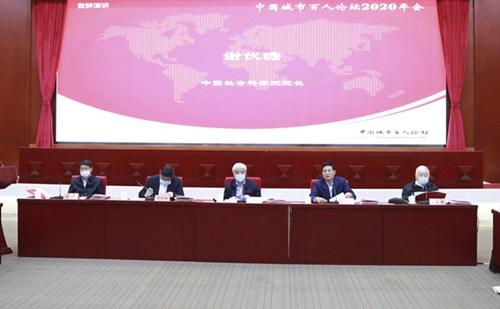
. > FOCUS > URBANIZATION
Forum eyes urban development during 14th FYP
Author : WANG CHUNYAN Source : Chinese Social Sciences Today 2020-11-13

Experts explored China’s urban development over the 14th Five-Year Plan (FYP) period at the 2020 annual conference of the China Urban Forum 100 in Beijing on Oct. 25.
Xie Fuzhan, president of the Chinese Academy of Social Sciences (CASS), said that building a new type of urbanization is not only an effective way to boost domestic demand, but also an important measure for establishing a new development pattern. During the 14th FYP period and for some time to come after, culture, wisdom and ecology will become the direction of and main focus for the high-quality development of new-type urbanization. This type of development needs to have reform and innovation as its fundamental driving force. It must build on a sound relationship between the government and the market, a new type of urban-rural relationship, and deepened reform in key areas.
Li Xiaohong, president of the Chinese Academy of Engineering, shared three things that he drew from China’s fight against the pandemic that can be applied to urban development. First, a city that puts people first is one that has warmth and embodies humanistic care. Second, smart industries, including big data, cloud computing, and AI, enable a city to function quickly. Third, cities will become better places with continued improvements in their ecologies and living environments. Having gone through the challenges posed by the pandemic, Chinese cities will be managed and transformed for the better. We need to explore how to build agglomerations centered around cities, and focus on urban development and construction for the next five years.
Cities that truly suit mankind are the ones that are smarter, greener and more humanistic, observed Gao Hongjun, vice president of the Chinese Academy of Sciences (CAS). We need to do more research on the country’s urbanization strategies and science and technology policies that serve Beautiful China and Healthy China initiatives. It is necessary to strengthen theoretical and technological innovation in urban governance, environmental governance, ecological construction, resource utilization, and industrial development that orients toward green urbanization. In addition, we need to enhance cross-over studies in science, technology, and engineering to assist the building of a smart city. We also need to work on the integrated natural science and social science studies of people-oriented city management.
Wang Yiming, secretary-general of the National Development Planning Expert Committee of the 14th Five-Year Plan, analyzed what dual circulation means to China’s urbanization process. He explained that the new development pattern requires China to meet the following requirements for its urbanization endeavor. First, accelerate the citizenization of rural migrants. Second, strengthen the pivotal and strategic role of metropolitan regions and city clusters in dual circulation. Third, enhance central cities’ capacity to lead and drive innovation. Fourth, develop more competitive city clusters in China’s inland area. Fifth, ensure equitable access to and availability of basic public services. Sixth, increase the level of modernization for city governance.
Li Yang, former vice president of CASS, said that we need to work on issues related to capital sourcing when developing a city. Local governments’ active role is the key to China’s economic miracle. A big difference between the socialist market economy and the capitalist market economy is the role that a government plays. He suggested transforming government functions, and drastically reducing the government’s direct intervention in resource allocation, maximizing the benefits and efficiency of resource allocation by upholding market rules, values, and competition.
The future landscape of urbanization is largely determined by our choice of locations, said Fan Jie, deputy director of the Institutes of Science and Development at CAS. Talent will play an increasingly important role in this regard. Apart from looking at a place’s basic attributes, i.e. safety and social stability, talent prefers to stay where they can best realize their own value. They prefer places that are vibrant, innovation-friendly and have strong innovation capacity. What’s more, these places must have a sound ecological environment and a supporting system that satisfies local talent’s needs.
Ye Shengtao made Chinese fairy tales from a wilderness
Ye Shengtao (1894–1988) created the first collection of fairy tales in the history of Chinese children’s literature...
-
How northern ethnicities integrated into Chinese nation
2023-09-18
-
Mogao caves
2023-09-12
-
Mogao Grottoes as ‘a place of pilgrimage’
2023-09-12
-
Time-honored architectural traditions in China
2023-08-29
-
Disentangling the civilizational evolution of China
2023-08-28
-
AI ethics in science fiction
2023-08-23













 2011-2013 by www.cssn.cn. All Rights Reserved
2011-2013 by www.cssn.cn. All Rights Reserved